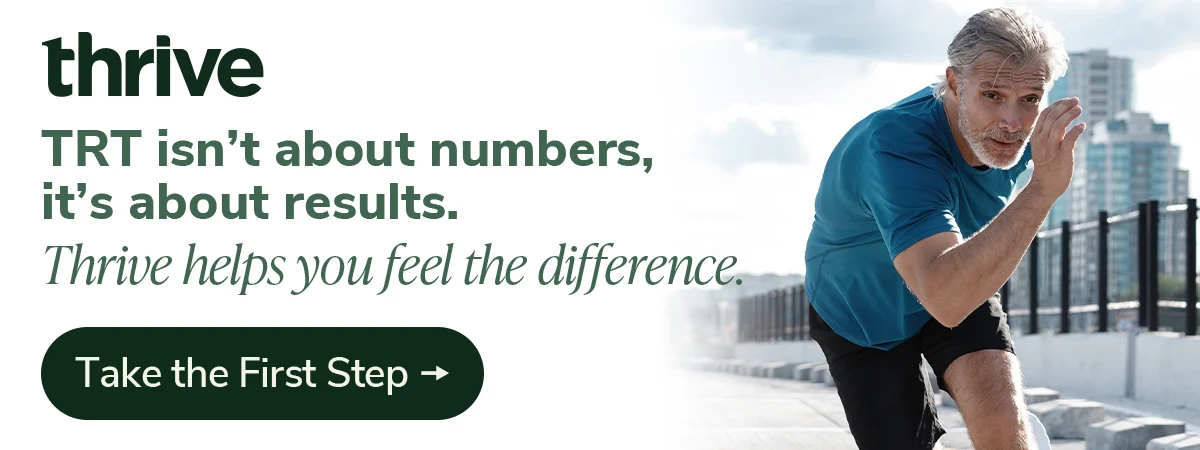Optimizing Testosterone with Dr. Andrew Sun
Testosterone is often misunderstood and underestimated. While many associate it with muscles and libido, this powerhouse hormone plays a critical role in men’s overall health, vitality, and longevity.
At Thrive Wellness, we believe men’s health deserves more than a surface-level approach. In this conversation with Harvard-trained urologist and Thrive Medical Advisory Board member Dr. Andrew Sun and Thrive’s Chief Medical Officer Dr. Jared Pelo, we break down what testosterone really does, what happens when it drops too low, and how hormone optimization can help you take back control of your health and your future.
Whether you're feeling chronically tired, experiencing low libido, or just curious about optimizing your health, this is your starting point. Let’s talk testosterone—and why it matters more than you think.
Testosterone: Your Body’s Silent Signal
Testosterone is one of the most powerful indicators of a man’s overall health. This essential hormone plays a central role in your energy, focus, metabolism, and long-term vitality.
"Most people think, based on popular media, it's just muscles and sex—and it is those things," says Dr. Andrew Sun, board-certified urologist. “But it’s also a lot more than that.”
Dr. Sun describes testosterone as one of the clearest internal signals we have: “Testosterone is just another arm of metabolic health,” he explains. “Yes, there is a decline in testosterone as you get older, but really the cause of low T is metabolic syndrome… (which is what also) causes diabetes, high blood pressure, high cholesterol, etc.”
Hormonal imbalances like low T often appear before more obvious signs of metabolic dysfunction. It can manifest as fatigue, brain fog, low motivation, or mood swings, symptoms that are easy to brush off but may actually be early warnings.
“We jokingly call testosterone or the penis the check engine light for the body,” Dr. Sun shares. “When that comes on, that's when you know something under the hood requires fixing.”
This metaphor isn’t just clever—it’s diagnostic. Dr. Sun regularly sees young men in their 20s and 30s with testosterone levels in the 150s (a concerningly low range), often due to obesity, sleep deprivation, and chronic stress. Meanwhile, some of his 70-year-old patients have testosterone in the 700s. “It's not just something that happens when you're 60 or 70,” he says. “You can have it (low T levels) at any age.”
Testosterone is a biomarker of total body function. When evaluated correctly, it can uncover deeper patterns of inflammation, stress, and metabolic dysfunction. And when optimized, not only does it restore libido or muscle mass—it improves how you think, feel, and move through life.
Low T As A Check Engine Light
Consider low testosterone as a symptom that comes with its own deeper message. It’s the body’s check engine light, and like any dashboard warning, ignoring it can lead to bigger problems down the road.
Dr. Sun explains that testosterone is deeply tied to the metabolic system. Issues like poor sleep, stress, obesity, and insulin resistance directly impact your hormones. In fact, metabolic syndrome is the most common cause of low testosterone, especially in younger men. “Usually they’re morbidly obese, not sleeping well, under a lot of stress, and disconnected from their health,” he explains. “It’s not just about age, it’s about what’s happening under the hood.”
That’s why testing your hormones consistently is so important. When men feel tired, foggy, or unmotivated, it’s easy to write it off as burnout. But those symptoms are often your body asking for help. Whether you're 28 or 68, having low testosterone is a prompt to pay attention, dig deeper, and start turning things around before more serious issues develop.
When and How to Treat Low Testosterone
Not every case of low T requires immediate treatment, but according to Dr. Sun, there’s a point where low becomes risky, and where action can dramatically improve both short-term quality of life and long-term health outcomes.
“If someone’s at 275, I’ll say, ‘You could treat it (with testosterone therapy)—you don’t have to.’ But below 200? That’s where we start seeing real medical risks,” Dr. Sun explains. And thanks to recent research, we now have the data to back that up.
A 2024 meta-analysis published in the Annals of Internal Medicine found that men with testosterone levels under 210 had significantly higher all-cause mortality. For levels under 150, the risk of heart attack and cardiovascular events increased by 30–40%. In other words, untreated low T isn’t just about how you feel, it can affect how long you live.
At Thrive Wellness, we examine the full picture first. That includes lab work to determine if your testosterone is low. Then we determine whether it’s low because the brain is not sending the right hormonal signals (central hypogonadism), or the testicles are no longer responding (primary hypogonadism).
“If you have low T and your brain hormones (Follicle Stimulating Hormone (FSH) and Luteinizing Hormone (LH)) are also low, that implies stress, poor sleep, or lifestyle issues,” Dr. Sun explains. “But if your FSH and LH are high and your testosterone is still low, then your brain is screaming at your testicles to make more—and they can’t.”
This distinction helps guide next steps. If your body can’t produce its own testosterone, we focus on the treatment options that support hormone production such as oral TRT.
“The number one symptom I treat isn’t actually sexual dysfunction,” Dr. Sun says. “It’s being tired. Guys come in and say they’re just exhausted. Then you test their testosterone and it’s low, and it becomes this cyclical downhill thing: less energy, less exercise, more fat gain, lower T—and the cycle repeats.”
In some care models, TRT is used as a short-term tool to help patients regain energy while making lifestyle changes. With time, some patients can come off therapy altogether once their natural testosterone levels are within optimal ranges. No matter what the underlying reasons are, the goal is the same: restore balance, prevent disease, and help you feel like yourself again.
Your Treatment Options: Boost or Replace
Low testosterone isn’t the same story for every man—so the solution shouldn’t be either. Everyone’s body, goals, and health history are different. Some may benefit from stimulating their natural testosterone production, while others may need replacement therapy to restore balance and improve symptoms.
Option #1: Boosting Natural Production
For men whose systems are still responsive, it may be possible to enhance the body’s own testosterone output through lifestyle changes, nutrition, and medications that encourage hormonal signaling. This approach is often explored by those looking to maintain fertility, support long-term hormone health, or address early-stage imbalances.
While boosting testosterone naturally may take time and commitment, it can be an empowering way to improve energy, performance, and mood—especially when paired with improvements in sleep, stress management, and strength training.
Option #2: Testosterone Replacement Therapy
In cases where natural production is no longer sufficient, testosterone replacement therapy (TRT) may be appropriate. TRT involves supplementing testosterone directly through methods like oral capsules, injections, topical gels, or subcutaneous pellets.
Each method has its own pros and cons, and the best option depends on factors like lifestyle, symptom severity, tolerance, and treatment goals. Some approaches are more gradual and rhythm-based, while others deliver a stronger, longer-lasting effect.
Final Thoughts: What Your T Levels Are Telling You
Testosterone plays a far greater role in your health than most people realize. Beyond sex drive and muscle mass, it’s deeply connected to your energy, mood, metabolism, and long-term vitality. If your levels are low, it’s not just a number—it’s a message.
Here’s what your testosterone levels are telling you:
- Low testosterone can occur at any age, often due to lifestyle factors like poor sleep, obesity, stress, and insulin resistance
- It’s not just a quality-of-life issue—untreated low testosterone is linked to increased cardiovascular risk and earlier mortality
- Testosterone levels reflect your metabolic health, acting as a “check engine light” for deeper dysfunctions
- Treatment options range from boosting natural testosterone production to full replacement therapy, and the best path depends on your symptoms, goals, and lab results
- Lifestyle changes still matter. Even with treatment, your long-term hormone health depends on what you eat, how you sleep, and how you move
At Thrive Wellness, we approach men’s health optimization with curiosity, care, and clarity. Whether you're dealing with hormonal imbalance or simply want to feel better than “fine”, we're here to help you make informed, empowered choices.


-1.jpg)

